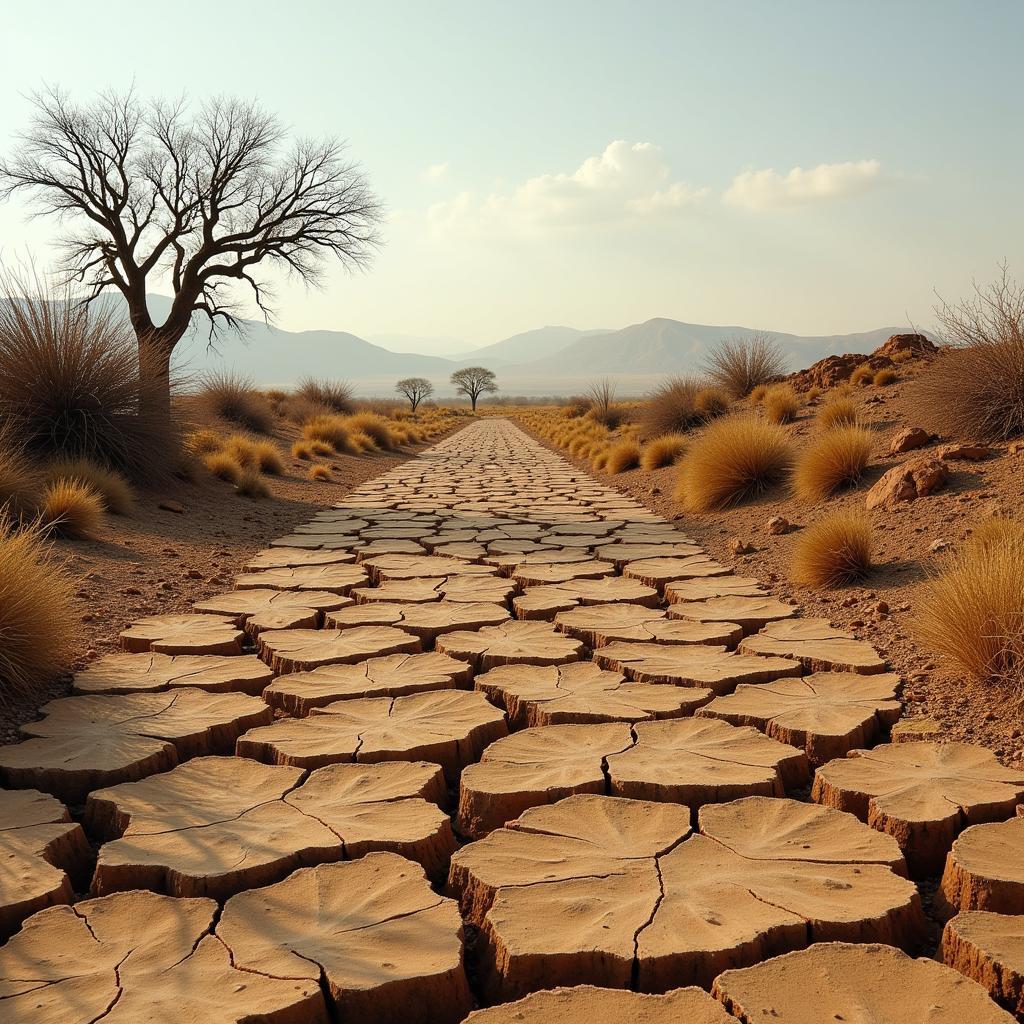Pakistan, a land of diverse landscapes, boasts a significant portion covered by desert areas. These arid expanses, encompassing vast stretches of Sindh, Balochistan, and Punjab, are characterized by their unique ecosystems, cultural heritage, and economic significance. This article delves into the captivating world of Pakistan’s desert areas, exploring their geographical features, cultural tapestry, economic potential, and the challenges they pose.
A Journey Through Pakistan’s Desert Landscapes
The Desert Areas Of Pakistan are primarily dominated by two major deserts: the Thar Desert, also known as the Great Indian Desert, and the Cholistan Desert. The Thar Desert, stretching across southeastern Pakistan and into India, is a vast expanse of sand dunes, salt flats, and scattered oases. In contrast, the Cholistan Desert, located in the southern Punjab province, features a more undulating terrain with gravel plains and scattered vegetation.
These deserts, though seemingly barren, are home to a surprising array of flora and fauna adapted to the harsh conditions. From resilient shrubs like the Prosopis cineraria, locally known as “Jand,” to the elusive desert fox and the endangered Chinkara gazelle, these ecosystems exhibit remarkable biodiversity.
A Tapestry of Culture and Heritage
The desert areas of Pakistan are not merely geographical marvels; they are also cradles of ancient civilizations and vibrant cultures. The Thar Desert, in particular, holds immense historical significance, with archaeological evidence pointing to human settlements dating back to the Indus Valley Civilization.
The indigenous communities inhabiting these regions have developed unique cultural practices and traditions that have stood the test of time. The nomadic lifestyles of the Maldhari in the Thar Desert and the Cholistani people in the Cholistan Desert are deeply intertwined with their environment, relying on camel herding, livestock rearing, and traditional crafts for sustenance.
Economic Potential Amidst Aridity
Despite the challenges posed by the arid environment, the desert areas of Pakistan possess significant economic potential. Mineral resources, particularly coal and gypsum, are found in abundance in these regions. The Thar Coal Project, for instance, aims to utilize the vast coal reserves of the Thar Desert for power generation, potentially transforming Pakistan’s energy landscape.
Moreover, the unique ecosystem of the desert areas presents opportunities for eco-tourism and adventure sports. The annual Cholistan Desert Jeep Rally, attracting thrill-seekers from across the country, showcases the region’s tourism potential. Additionally, the development of solar energy projects in these sun-drenched areas holds immense promise for renewable energy generation.
Confronting the Challenges of Aridity
While the desert areas of Pakistan offer unique opportunities, they also present formidable challenges. Water scarcity is a pressing issue, with limited rainfall and high evaporation rates. Access to clean drinking water remains a challenge for many communities, impacting their health and well-being.
Desertification, the process of land degradation in arid areas, is another significant concern. Overgrazing, deforestation, and unsustainable agricultural practices exacerbate this problem, leading to soil erosion, loss of biodiversity, and increased vulnerability to droughts.
 Challenges of Desert Life
Challenges of Desert Life
Addressing the Needs of Desert Communities
Addressing the challenges faced by the communities residing in Pakistan’s desert areas requires a multi-faceted approach. Sustainable water management practices, such as rainwater harvesting, drip irrigation, and the construction of check dams, are crucial for conserving water resources and improving access to clean water.
Promoting sustainable land management practices, such as afforestation, rotational grazing, and the use of drought-resistant crops, is essential for combating desertification and ensuring the long-term productivity of the land. Investing in education, healthcare, and infrastructure development is vital for improving the quality of life for desert communities.
Conclusion
Pakistan’s desert areas, with their captivating landscapes, rich cultural heritage, and economic potential, are an integral part of the nation’s identity. By recognizing the challenges they pose and implementing sustainable solutions, we can ensure the preservation of these unique ecosystems and the well-being of the communities that call them home.
FAQs about Pakistan’s Desert Areas
1. What is the largest desert in Pakistan?
The Thar Desert, also known as the Great Indian Desert, is the largest desert in Pakistan, covering a significant portion of Sindh province and extending into India.
2. What are the main economic activities in Pakistan’s desert areas?
The main economic activities in Pakistan’s desert areas include livestock rearing, camel herding, traditional crafts, mining (coal and gypsum), and emerging sectors like eco-tourism and solar energy.
3. What are the major challenges faced by the people living in desert areas?
The major challenges faced by people living in desert areas include water scarcity, desertification, limited access to healthcare and education, and economic opportunities.
4. What steps are being taken to address the issue of water scarcity in desert areas?
The government and NGOs are working on initiatives like rainwater harvesting, construction of check dams, and promoting drip irrigation to address water scarcity in desert areas.
5. How can tourism benefit the desert communities?
Tourism can provide alternative income sources for desert communities, promote cultural exchange, and raise awareness about the importance of preserving these unique ecosystems.
Exploring Pakistan’s Diverse Landscapes
For those interested in delving deeper into Pakistan’s diverse landscapes and cultural experiences, consider exploring the following resources:
- Mutalia Pakistan Class 9 Book: A comprehensive resource providing insights into Pakistan’s geography, history, and culture.
- Cloud Satellite View of Pakistan: Experience the breathtaking views of Pakistan’s diverse landscapes, including its vast desert areas, from a satellite perspective.
Need Help Planning Your Desert Adventure?
Contact us at +923337849799 or email us at news.pakit@gmail.com. You can also visit us at Dera Ghazi Khan Rd, Rakhni, Barkhan, Balochistan, Pakistan. Our team is available 24/7 to assist you with your queries.